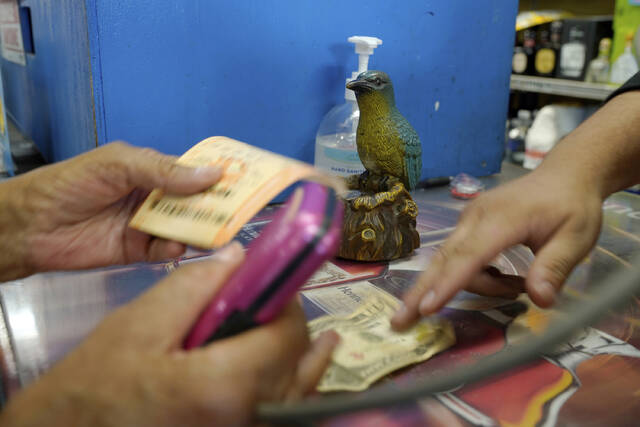Have you bought your ticket yet?
It almost goes without saying that the ticket in question is not for a train, plane or concert. For the second time this year, the country is gripped in lottery fever. Saturday’s multi-state Powerball jackpot will top $1.5 billion and might climb even higher as the lure of that prize brings in more and more fervent players.
It is the fifth time the Powerball or Mega Millions jackpot has promised coyly to make someone a billionaire. Despite the giant number, it has never actually happened. The cash value has always fallen just shy, and the record-setting $1.58 billion prize — cash value of $983.5 million — from 2016 was split between winners in three states.
From Greensburg to Tarentum to Pittsburgh and beyond, you can find lines cropping up around gas stations and grocery stories selling the little slips of paper that could change lives.
Is that siren song harder to resist right now? Billionaires are the new millionaires, for one thing. A $1 million net worth isn’t what it once was. All the richest people right now are well above the million mark. You can’t buy yourself a social media platform or start a space travel business with a mere few hundred million.
Then there is the economy. Having a $1 billion nest egg is exactly the kind of security people can crave when the jobs that once provided a good living are now stretched thin between the grocery store, gas pump and rent check. Inflation is making things tough all over but nowhere so much as the lower-middle class rungs on the ladder and those beneath.
For some people, buying that lottery ticket will be a daydream — a “what would I do if I won” moment thinking about quitting a job and going on a real estate shopping spree. For others it is a retirement plan. That’s nothing new. Research has shown that the lower the income, the more likely a lottery player sees a ticket as an investment rather than entertainment.
States have a vested interest in pushing that “make a wish” mindset because of the cut they take. Pennsylvania sold $5 billion in traditional lottery tickets in the 2021-22 fiscal year, with $1.5 billion going to programs for seniors that would otherwise require tax money to fund or not happen at all.
But would the average retail worker or waitress be better off putting that $2 to work in a different way rather than buying a lottery ticket? Most financial advisers would say yes. The odds of winning the lottery are astronomical.
According to money site The Motley Fool, you are more likely to be attacked by a shark, struck by lightning or contract the plague.
Then again, a Crafton woman was attacked by a shark this year. St. Boniface Roman Catholic Church on Pittsburgh’s North Side was struck by lightning in August. And plague? We’ve spent two years battling a pandemic. These things are seeming like less of a longshot.
Maybe that $2 ticket is worth the daydream for the people whose lives would change. The people in power, however, need to remember the millions who will never become billionaires and work on fixing the system for them.








